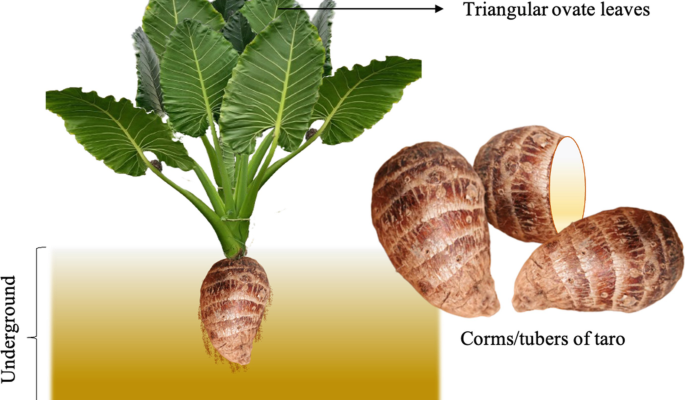Introduction: The Importance of Digestive Health
Digestive health is foundational to overall well-being. A properly functioning digestive system ensures the body can effectively process and absorb nutrients, detoxify waste products, and maintain a balanced microbiome. Poor digestive health, characterized by conditions like constipation, bloating, and irritable bowel syndrome (IBS), can lead to significant discomfort and long-term health complications.
In recent years, there has been growing interest in natural foods that support digestive health. One such food is Taro (Colocasia esculenta), a root vegetable with a rich history of consumption and numerous health benefits. Taro is not only a culinary staple in many cultures, particularly in Southeast Asia, but it also offers a unique combination of nutrients that can help promote optimal colon and digestive health.
This article will explore the various ways in which Taro can be beneficial for digestive health, focusing on its nutritional profile, digestive benefits, and practical uses in promoting colon health.
Section 1: What is Taro (Colocasia esculenta)?
Taro (scientific name: Colocasia esculenta) is a starchy root vegetable that has been cultivated for thousands of years, primarily in tropical and subtropical regions of the world. Native to Southeast Asia and the Indian subcontinent, Taro is now grown in various parts of the world, including Africa, the Pacific Islands, and parts of Central America.
Taro is commonly recognized for its large, heart-shaped leaves and thick, bulbous root, which is typically white or purple-tinged when peeled. The root is the edible part of the plant, and it can be prepared in a variety of ways, such as boiled, steamed, roasted, or mashed. Taro has a nutty flavor and a starchy, dense texture that makes it a versatile ingredient in both savory and sweet dishes.
Despite its simple appearance, Taro is a powerhouse of nutrients, including fiber, vitamins, minerals, and antioxidants. These nutrients are vital for maintaining digestive health, making Taro a valuable addition to a balanced diet.
Section 2: Nutritional Profile of Taro
Before diving into the digestive benefits of Taro, it’s important to understand its nutritional composition. Taro is a nutrient-dense root vegetable, and consuming it regularly can support a wide range of bodily functions.
2.1 Macronutrients
Carbohydrates: Taro is rich in complex carbohydrates, which provide a steady source of energy. It is a low-glycemic food, meaning it does not cause rapid spikes in blood sugar levels, making it a good option for individuals with diabetes or those looking to manage blood sugar.
Fiber: One of the key benefits of Taro is its high fiber content. A 100-gram serving of Taro provides about 4 grams of dietary fiber. The majority of this fiber is soluble, which can help regulate bowel movements and promote healthy digestion.
Proteins: While Taro is not a significant source of protein, it contains small amounts of this essential macronutrient, contributing to the overall nutritional value of the vegetable.
2.2 Micronutrients
Taro is rich in several important vitamins and minerals that play a vital role in supporting digestive health:
Vitamins: Taro is a good source of vitamin C, a powerful antioxidant that supports immune function and helps protect the digestive tract from oxidative stress. It also contains B-vitamins, including vitamin B6, which is involved in the synthesis of neurotransmitters that support gut motility and function.
Minerals: Taro is particularly high in potassium, which is essential for maintaining proper fluid balance and muscle function, including the muscles involved in digestion. Additionally, it contains magnesium, calcium, and iron, all of which contribute to overall digestive and metabolic health.
Antioxidants: Taro contains several bioactive compounds, including flavonoids, phenolic acids, and carotenoids, which have antioxidant properties. These antioxidants can help reduce inflammation in the digestive system, protect gut cells from damage, and support the healing of the intestinal lining.
Section 3: How Taro Supports Digestive Health
Now that we have a clearer understanding of Taro’s nutritional benefits, let’s explore how this root vegetable can specifically support digestive health.
3.1 High Fiber Content Promotes Regularity
One of the primary ways that Taro contributes to digestive health is through its high fiber content. As mentioned earlier, fiber plays a critical role in maintaining healthy digestion. Taro contains both soluble and insoluble fiber, which work together to improve gut health.
Soluble Fiber: The soluble fiber in Taro absorbs water and forms a gel-like substance in the intestines. This helps to soften stool, making it easier to pass and reducing the risk of constipation. Soluble fiber also promotes the growth of beneficial gut bacteria, which is essential for maintaining a healthy microbiome.
Insoluble Fiber: Insoluble fiber adds bulk to the stool, aiding in regular bowel movements. It helps prevent bloating and gas by promoting the efficient movement of food through the digestive tract. Regular consumption of fiber-rich foods like Taro can reduce the risk of developing chronic conditions like diverticulitis and colorectal cancer.
3.2 Gut Health and the Microbiome
Emerging research suggests that the gut microbiome—the collection of trillions of bacteria that reside in the intestines—plays a significant role in digestion, immune function, and overall health. A healthy microbiome is essential for efficient nutrient absorption, immune defense, and the prevention of digestive diseases.
The prebiotic fibers in Taro serve as food for beneficial gut bacteria, helping to nourish and support a balanced microbiome. A healthy gut flora enhances the digestion of complex carbohydrates, reduces inflammation in the intestines, and promotes the production of short-chain fatty acids (SCFAs) that benefit gut cells.
3.3 Anti-inflammatory Properties
Inflammation in the digestive tract is a hallmark of several gastrointestinal disorders, including irritable bowel syndrome (IBS), Crohn’s disease, and ulcerative colitis. Chronic inflammation can impair the function of the gut lining, disrupt digestion, and cause discomfort.
Taro is rich in antioxidants, including flavonoids and phenolic compounds, which have been shown to possess anti-inflammatory properties. These antioxidants help protect the digestive tract from oxidative stress and inflammation, promoting a healthier gut environment.
3.4 Digestive Enzyme Support
Taro contains small amounts of enzymes that can aid in the breakdown of carbohydrates and starches. These enzymes assist in digestion by helping the body to efficiently process and absorb nutrients from the food consumed. This can be particularly beneficial for individuals with digestive conditions that impair enzyme function, such as pancreatic insufficiency or malabsorption syndromes.
Section 4: Taro and Colon Health
In addition to promoting general digestive health, Taro can specifically benefit colon health. The colon is the final stage of the digestive system, where water is absorbed, and waste is formed into stool. Healthy colon function is crucial for preventing constipation, maintaining hydration, and eliminating toxins from the body.
4.1 Colon Cleansing and Detoxification
The fiber in Taro helps to cleanse the colon by facilitating regular bowel movements and eliminating waste from the body. Fiber acts as a natural scrubber for the colon, preventing the buildup of harmful substances and supporting the detoxification process. Regular fiber intake is associated with a reduced risk of developing colon cancer, as it helps to remove potential carcinogens from the digestive tract.
4.2 Preventing Constipation
One of the most common digestive issues, constipation can lead to discomfort, bloating, and a host of other health problems. Taro’s high fiber content, particularly its insoluble fiber, helps to add bulk to stool and promotes its movement through the colon. This can help prevent constipation and ensure that the digestive system operates efficiently.
4.3 Reducing Risk of Colorectal Diseases
Studies have shown that a diet high in fiber-rich foods like Taro can reduce the risk of developing colorectal diseases, including colorectal cancer. Fiber promotes the production of short-chain fatty acids (SCFAs), which nourish colon cells, support a healthy gut lining, and inhibit the growth of cancerous cells. Furthermore, fiber reduces the time that potentially harmful substances stay in contact with the colon lining, minimizing the risk of inflammation and cellular damage.
Section 5: How to Incorporate Taro into Your Diet
Given the many health benefits of Taro, it’s worth finding ways to incorporate this versatile root vegetable into your daily diet. Here are some ideas for preparing and consuming Taro:
Taro Chips: Thinly slice Taro and bake or fry them to make crispy chips. These can be seasoned with herbs and spices for a flavorful, fiber-rich snack.
Taro Stews and Soups: Taro can be added to soups and stews for added texture and nutritional value. It pairs well with root vegetables, leafy greens, and lean meats.
Mashed Taro: Just like mashed potatoes, Taro can be boiled and mashed with butter, milk, or plant-based alternatives for a creamy side dish.
Taro Smoothies: Blend boiled or steamed Taro with fruits and vegetables to create a nutrient-packed smoothie. The starchy consistency of Taro can help thicken the smoothie for a satisfying meal.




Spot on with this write-up, I actually think this web site needs far more consideration. I抣l in all probability be again to read much more, thanks for that info.
Your perspective on this topic is refreshing! The examples provided make it easy to understand. Your writing style makes this topic very engaging. Fantastic job covering this topic in such depth! Thanks for taking the time to put this together!